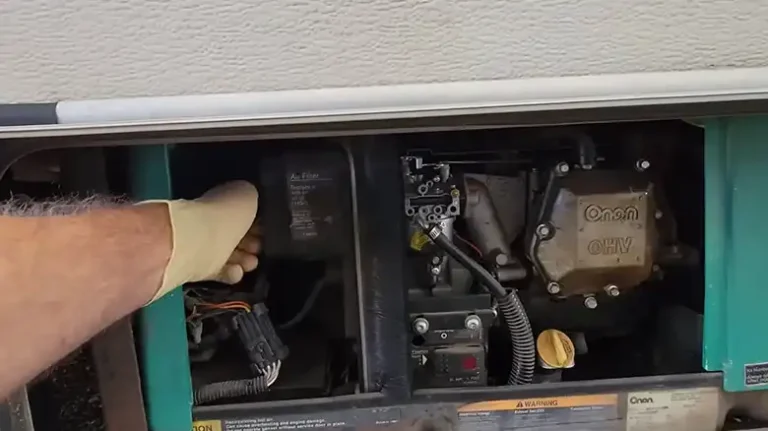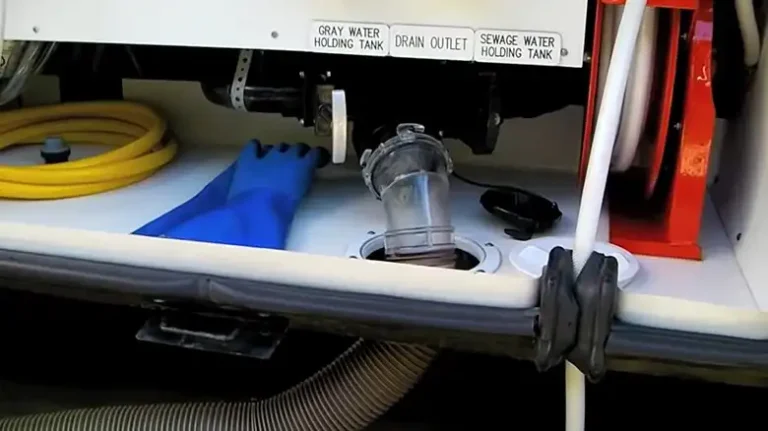RV Maintenance Checklist | What I Do
Owning a recreational vehicle enables pursuits of new horizons and adventures. But keeping your home on wheels functioning optimally over miles of travel requires diligent care and maintenance along the way. Use this RV maintenance checklist to help monitor critical components and prevent avoidable breakdowns or hazards.
Performing routine upkeep catches minor issues before they become major headaches down the road. Prioritize safety and reliability with regular recreational vehicle inspection and servicing.
Let’s explore the nuts and bolts of maintaining your RV, ensuring that every trip is a smooth ride into the sunset.

Why Consistent RV Maintenance Matters
Before we roll up our sleeves and open the checklist, let’s understand why routine RV maintenance is the unsung hero of your travel escapades. Imagine cruising down the highway, wind in your hair, only to be halted by a preventable breakdown. Regular maintenance ensures your RV stays road-worthy, reduces the risk of unexpected issues, and extends the lifespan of your beloved rolling abode.
Like any complex vehicle, RVs suffer wear and tear from road vibrations, weather exposure, and component aging. Without proactive stewardship, problems accelerate. Skipping maintenance leads to:
- Costly unexpected repairs from sudden breakdowns
- Extended downtime being stuck at repair shops
- Potential safety risks from tire blowouts, faulty brakes or other failures
Don’t learn the hard way by letting preventative care slide. Keep your investment protected and mobile with some basic mechanical skills and this checklist guide.
Checking Maintenance List Before Each Trip
Quick pre-departure inspections ensure readiness to cruise safely. Always check:
- 1. Inspect Tires

Before you hit the road, give your tires some love. Check for proper inflation, tread wear, and any visible damage. A well-maintained set of tires ensures a smooth and safe journey.
- 2. Test Lights

Visibility is paramount, especially during nighttime drives. Test all exterior and interior lights to guarantee they’re in working order, keeping you visible and safe on the road.
- 3. Check Trailer Hitch/Towing Components

For towing enthusiasts, ensuring the hitch and towing components are secure is non-negotiable. A thorough check ensures a secure connection between your RV and any towed vehicles.
- 4. Inspect Propane System
Propane powers many essential RV functions. Inspect the system for leaks, ensure connections are tight, and verify that all appliances are functioning correctly.
- 5. Clear Debris from Roof
A clean roof isn’t just cosmetic; it prevents water damage and maintains your RV’s structural integrity. Remove debris, leaves, and other gunk to keep your roof in top shape.
- 6. Test Electrical Components and Appliances
From your air conditioner to the coffee maker, test all electrical components and appliances to guarantee they’re ready for action. A pre-trip check ensures no unpleasant surprises mid-journey.
- 7. Secure Interior Items
Prevent the ‘RV shuffle’ by securing interior items. A quick walkthrough to ensure everything is stowed away properly avoids potential damage during transit.
Monthly Maintenance Checks

On a monthly basis, examine:
- 1. Drive Motorhome
Even if your RV sits idle for most of the month, take it for a spin. Regular movement prevents tire flat-spotting and ensures all systems remain lubricated.
- 2. Run Generator
Generators need exercise too. Running it monthly keeps the engine lubricated and the generator ready for action when you need it most.
- 3. Check Battery Water Levels
Batteries are the lifeblood of your RV. Regularly check water levels, top up distilled water if necessary, and ensure connections are clean and tight.
- 4. Clean A/C Vents and Ducts
Air quality matters. Regularly clean A/C vents and ducts to ensure a steady flow of clean, cool air throughout your RV.
- 5. Inspect Under Hood
An often-overlooked area, the RV’s under hood deserves attention. Check for any signs of wear, loose connections, or leaks to keep your engine running smoothly.
- 6. Inspect the Underside of the RV
Your RV’s underbelly can face harsh conditions. Regular inspection ensures no surprises, such as damaged pipes or potential pest infestations.
- 7. Test Safety Equipment
Safety first! Test smoke detectors, carbon monoxide detectors, and fire extinguishers to guarantee they’re ready to protect you in case of an emergency.
- 8. Check Seals
Water damage can be a silent killer. Regularly inspect and replace worn-out seals to keep your RV watertight and free from leaks.
- 9. Lubricate Slideouts
Keep your slideouts gliding smoothly by regularly lubricating the moving parts. This simple step prevents jams and extends the life of your slideouts.
- 10. Check for Pests
Unwanted guests aren’t just limited to human campers. Regularly check for signs of pests and take preventive measures to keep critters at bay.
Fixing small problems now prevents bigger headaches later.
Seasonal Maintenance

Major maintenance tasks should occur 2-4 times per year before/after peak travel seasons:
- 1. Wash and Wax Exterior
Give your RV a spa day! Washing and waxing the exterior not only keeps it looking sharp but also protects it from the elements.
- 2. Deep Clean Interior
A clean living space is a happy living space. Deep clean the interior, paying attention to nooks and crannies that are often overlooked.
- 3. Clean or Replace the Awning
Awnings provide shade and comfort. Regular cleaning or replacement ensures they stay functional and add to the aesthetic appeal of your RV.
- 4. Change Fluids
Oil, transmission fluid, brake fluid – they all play crucial roles. Regular fluid changes keep your RV’s vital systems operating smoothly.
- 5. Replace Filters
Clean air is essential for a pleasant journey. Replace air, fuel, and water filters as part of your seasonal maintenance routine.
- 6. Flush and Clean Holding Tanks
Maintain your RV’s plumbing by regularly flushing and cleaning holding tanks. This prevents odors and ensures efficient waste disposal.
- 7. Weigh RV
Weight matters. Regularly weigh your RV to ensure it stays within its recommended weight limits, optimizing safety and performance.
- 8. Treat Metals
Prevent corrosion by treating exposed metals. A protective coating goes a long way in preserving the structural integrity of your RV.
Annual Maintenance

Critical annual servicing jobs:
- 1. Service A/C and Furnace
Extreme temperatures demand a well-functioning HVAC system. Annual servicing ensures your A/C and furnace keep you comfortable year-round.
- 2. Service Brakes
Brakes are your RV’s safety net. Yearly servicing, including inspection and potential replacement, guarantees they’re ready for any unexpected stops.
- 3. Inspect Propane System
Propane safety is paramount. An annual inspection ensures there are no leaks or issues, keeping your propane system in top condition.
- 4. Reseal Exterior
Protect your RV from water damage by resealing exterior seams and joints. This simple step prevents costly repairs and maintains your RV’s structural integrity.
- 5. Sanitize Water System
A clean water system is a healthy water system. Sanitize your RV’s water system annually to ensure safe and clean drinking water.
- 6. Update Maintenance Log
A well-documented maintenance log is your RV’s health history. Update it annually to track all maintenance activities and identify patterns.
- 7. Rotate Tires
Even wear on your tires is crucial for safety. Annually rotating tires ensures even tread wear, extending their lifespan.
Don’t overlook in-depth annual checkups. Identify developing problems early.
Essential RV Amenities

Ensure you have the essential components for RV travel. Because it is crucial for a smooth and enjoyable experience. Here’s a summary of the must-have items:
- Wheel Chocks: Keep your RV stable and secure, preventing it from rolling away.
- Levelers: Ensure your RV is level for proper equipment functionality, especially on uneven ground.
- Drinking Water Hose: Use a dedicated hose to fill your freshwater tank at each destination; choose a potable water hose.
- Water Filter: Protect your pump and drinking water by using a water filter to remove debris.
- Sewer Hose: Invest in a quality 10- to 20-foot sewer hose with adapters to ensure effective waste disposal.
- Surge Protector: Safeguard your electronics from electrical surges and dips commonly found at campgrounds.
- Shore Power Cord: If your RV lacks a power cord, use a shore power cord instead of a regular home extension cord.
- Electrical Adapters: Carry adapters to adjust to different service outputs or receptacles as needed.
- Water Pressure Regulator: Use a valve to moderate water pressure from different sources, protecting your plumbing.
- Tire Pressure Gauge: Keep a digital pressure gauge handy to check and maintain proper tire pressure.
- Duct Tape: A versatile tool for quick fixes in various situations.
- Flashlight: Have a powerful, durable flashlight with long-lasting batteries for emergencies.
- Emergency Road Kit: Include essentials like water, blankets, ice scrapers, tire chains (in winter), tools, a first-aid kit, and more.
- Extra Motor Oil and Transmission Fluid: Keep some on hand for potential breakdowns far from a gas station.
- Fire Extinguisher: Carry a fire extinguisher for safety, addressing potential engine or RV-related fires.
- Closed Bag for Important Documents: Include documents such as registration, insurance, reservations, prescriptions, emergency contacts, allergies, etc.
Being well-prepared with these essentials ensures a safer and more comfortable RV travel experience, allowing you to handle various situations that may arise on the road.
Conclusion
Regular RV maintenance isn’t just a checklist; it’s your ticket to endless, worry-free adventures. By investing time and effort in routine care, you’re not just maintaining an RV; you’re nurturing a lifestyle. DIY maintenance is empowering, but safety comes first. Use appropriate safety gear, follow manufacturer guidelines, and don’t hesitate to seek professional help when in doubt. While DIY maintenance is commendable, there are times when expertise is crucial. Seek professional help for complex issues, major repairs, or if you’re unsure about a particular maintenance task. Safe travels! Please share your own RV maintenance tips or questions below.
FAQ – Navigating Curves in the Road
Is It Hard to Maintain an RV?
Maintaining an RV involves routine tasks that, with proper guidance, can be manageable. While some aspects require attention to detail, many routine checks are accessible for RV owners.
What’s the Average Maintenance Cost of an RV? (Monthly, Annual)
The average monthly maintenance cost for an RV can range from $100 to $500, depending on factors like age, usage, and DIY versus professional maintenance. Annual costs can vary from $1,200 to $6,000 or more.







